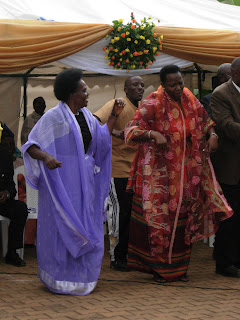
Traditionally, African weddings happen in two parts: first the giveaway and then the church wedding. I had the pleasure of attending a giveaway ceremony, where the dowry is negotiated and the bride is handed over to the groom’s family.
First on the agenda is mass, which is observed by the bride’s family before the groom arrives. Because Uganda is a deeply religious society, the service is taken very seriously. It was a mix of scripture reading and song. The song and dance is what appealed to me most. The elders and the aunties hop around and sing feverishly. The younger attendees and myself—the sole muzungu guest—joined in as well, but with a little less enthusiasm. I wasn’t feeling too spiritual.
Bride’s uncle: Hello ssebo (sir). What have you come here for today?
Groom’s spokesman: Thank you for welcoming me into your home. We have come here today because there is something in the house that we have our eye on. But first, let me offer you some gifts.
Members of the grooms party shuffle in with a dozen cases of sodas and beers.
Bride’s uncle: What is it that you’ve come here for?
Groom’s spokesman: We have an eye on one of your women
Bride’s uncle: You want to take our women!?
(Laughter)
Groom’s spokesman: Not all of them, just one of them.
Bride’s uncle: Well, if its one of our women that you’re after you will have to talk to the aunties in he family.
Here, the music starts up and the aunties come out of the house. They dance toward the centre of the garden and sit on mats on the ground.
The bride's cousins
Groom’s spokesman: Hello madams. We have come here today in search of one of your women.
Auntie: Which woman? What language does he speak.
Groom’s spokesman: uhh….
He doesn’t know the bride’s dialect, so the MC steps in and offers to help, but for a fee of course. Spokesman hands over an envelope of cash. Eventually, the spokesman gets the answer right.
After the exchange with the aunties, the young women emerge from the house. Among them is the bride, whose head is covered with the scarf. The spokesman identifies that one of these women is in fact who they came for. Then, the bride rises and moves toward her husband, head still covered. She pins a broach on his jacket to identify him. Applause erupts from the crowd.
Take your pick: the bride chooses her man.
That’s all I could really gather from the back and forth between the groom’s party and the bride’s family. After this, the uncle and several men from the groom’s crowd go inside to negotiate the brideprice. Traditionally, goats and cows are exchanged. But today, people in the city have little use for such gifts so instead cash is given along with furniture and, in wealthier families, cars.
After the dowry is agreed upon, a ribbon is cut which the man’s family has to walk through. This signifies that they have been welcomed into the clan. This is followed by mealtime. Because they are not officially in-laws yet, the man’s party is not permitted to dine with the bride’s family. So the groom eats outside and the bride’s family remains outdoors.
After the meal, it’s time for speeches. I only stuck around for one, since I had already been sitting for eight hours and had to leave. I heard the brother’s kind words to his sister:
“Sister, now you are leaving our house to be with your husband. I hope you know that you cannot return once you have left. You now belong to your husband’s home. This means you obey him and respect his rules. A relationship between man and wife is not completely equal, it’s not 50/50. He holds about 51% of the power, keep this in mind. But husband, this does not mean you can treat her disrespectfully. If she comes running back to us, it better be for a good reason and you should know we will always be here to defend her.”
The crowd was laughing as he spoke, so I could not tell whether he was joking or not. At any rate, it was a fun experience for a clueless muzungu.




